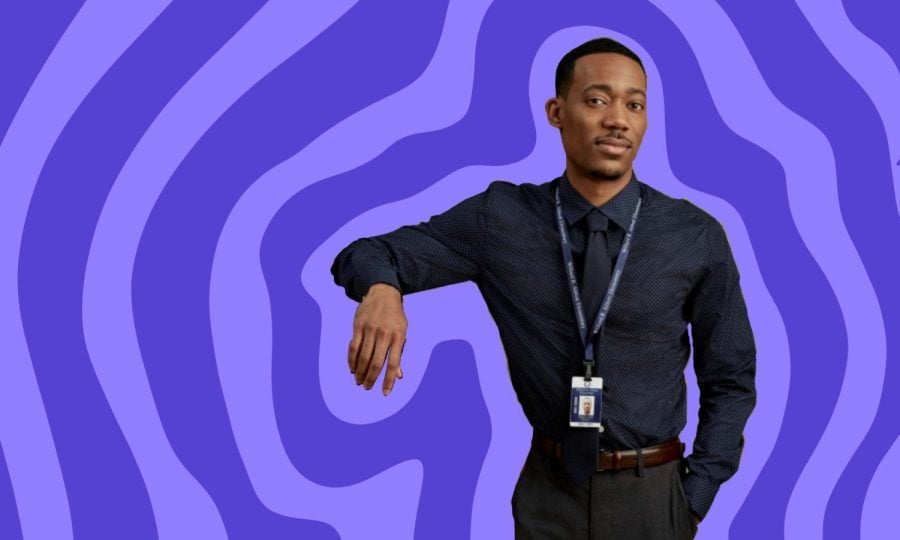
Tyler James Williams delivers address at State of the Black Union
Tyler James Williams spoke to For Members Only about finding a Black community in Hollywood and spotlighting hidden stories.
Northwestern’s For Members Only hosted “Abbott Elementary” star Tyler James Williams for its State of the Black Union address Thursday.
Communication Prof. Aymar Jean Christian moderated the event, which included an audience question and answer section at the end. Williams has appeared on a number of notable shows and movies, including “Let It Shine,” “Everybody Hates Chris” and “Dear White People.”
Williams spoke about his experiences with acting in educational roles, providing accessible comedy to all communities and embracing Blackness in a predominantly white industry.
“We have this superhuman ability to be able to make progress little by little, take an L, swallow it and keep going,” Williams said. “Be in conversation with those who came before so that you can understand they sacrificed, not so that you can just thrive, but understand the magnitude in their ability to sacrifice and their ability to go, ‘I would like this to be a certain way but it’s not yet and I will continue to work until it is.’ It is a Black superpower.”
Acting as a character in a predominantly white school in shows like “Everybody Hates Chris,” then in a predominantly Black school setting in “Abbott Elementary,” showed Williams the importance of Black spaces, he said. In some of his roles, Williams said he had his characters “code-switch” or stay silent when they interacted with non-Black students.
In “Abbott Elementary,” he said his experience playing a Black teacher in a predominantly Black school allowed him to highlight a new perspective in education-acting as his character advocated for his Black students. Christian said he watched his mother — who taught in a Black school in Harlem, New York for many years — undergo similar experiences.
“(My mom) would come home and talk about the kids (she taught) like they were her kids,” Christian said. “She had to care about them and think about their lives and the fullness of their experience in order to educate them.”
Williams said part of his mission is to provide accessible, quality entertainment and impact the average person’s experience. While large parts of Hollywood have started to shun network television in recent years, he said there’s a lot of value in being able to reach those who can’t afford cable subscriptions.
When “Abbott Elementary” writer Quinta Brunson asked him to be a part of the show, Williams said he agreed because he wanted to share the stories of unheard male Black teachers. He said he wants to reside in a space where he can be authentic, even in comedy.
“What makes the show work is it has a lot of heart because the actors, we don’t approach it joke-first,” Williams said. “We need everybody with basic cable to be able to access good entertainment that makes them feel good and moves the conversation forward.”
When acting, Williams said he tries to make his characters real. Hollywood’s mission for perfection has distanced the industry from its core audience, he said, but he wants to romanticize everyday life. He said glitz and glamor are attractive, but so are things people work toward and do every day.
FMO executive board members then asked questions submitted by students in the audience.
“What advice do you have for Black people trying to get into the industry, and how do we respect and love our Blackness while navigating the industry?” Weinberg senior Karina Karbo-Wright asked.
Williams said the hardest part about approaching the entertainment industry was figuring out what stories he wanted to tell and what good he wanted to spread through his acting. He added it is important to always try and find community and uplift one another.
He said the Black presence in Hollywood, while small, has supported him and that no one can make it through alone. People in the industry will try to tell Black people what to be, he said, and that is “definitely going to be anti-Black.” Silencing the noise and fortifying oneself are key tenets to making it, he added.
“Very few times you’re going to be clapped for as a Black person for being a Black person,” Williams said. “We need strong soldiers (to push Black conversations forward), and that means fortifying yourself mentally. But if you reside in a place where you need the acceptance or validation of others, unfortunately that acceptance and validation will very rarely validate the Blackness in you.”
Email: [email protected]
Twitter: @joannah_11
Related Stories:
— Faculty, students launch web exhibit covering Black organizing in pre-Civil War Illinois
— School of Communication hosts Dialogue with the Dean featuring actress Heather Headley

